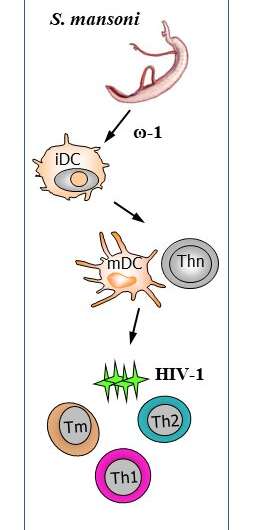Schistosoma mansoni egg antigen and more so ω-1 can induce dendritic cells to stimulate T cell responses with lowered infection for HIV-1 Credit: Mouser EE, et al. (2019)
Infection with parasitic helminths can reduce the susceptibility of T-cells to HIV-1 infection, according to a study published September 5 in the open-access journal PLOS Pathogens by Esther de Jong of the University of Amsterdam and William Paxton of the University of Liverpool, and colleagues.
Parasitic helminths such as Schistosoma mansoni (S. mansoni) have developed a number of strategies to evade, skew and dampen human immune responses, including the modulation of CD4+ T-lymphocyte responses. Since CD4+ T-lymphocytes are the main cell type infected with HIV-1, the immune responses mounted against the array of co-infecting pathogens will likely influence HIV-1 transmission and disease progression. Moreover, many areas endemic for S. mansoni infection have high HIV-1 prevalence rates, indicating that co-infection is likely. However, clear epidemiological evidence to date is lacking for the assumption that treating S. mansoni in co-infected individuals would be beneficial for their HIV-1 disease, as studies have reported contradictory findings.
In the new study, de Jong and Paxton analyzed the effect of soluble egg antigen (SEA) - an extract from the eggs of S. mansoni—on HIV-1 infection. SEA efficiently blocked HIV-1 trans-infection -a process by which immune cells called dendritic cells capture HIV-1 and promote infection of CD4+ T-lymphocytes. The underlying mechanism involved the binding of Kappa-5—a major molecular component of SEA—to DC-SIGN—a molecule expressed on dendritic cells. Under certain conditions, exposure of dendritic cells to SEA reduced the susceptibility of T-cells to HIV-1 infection. They also found that omega-1—an abundant component of SEA—can modulate HIV-1 infection and potentially influence disease course in co-infected individuals. According to the authors, these results should be considered in the context of HIV-1 vaccine trials being conducted in regions of the world where S. mansoni infections are endemic.
"Co-infection with HIV-1 and an array of pathogens can potentially modulate HIV-1 infection and therefore disease course," the authors add. "We demonstrate that specific molecules from the Schistosomula monsoni parasite can block both HIV-1 interactions with dendritic cells as well as induce CD4 lymphocytes which down-modulate infection with HIV-1."
More information: Mouser EE, Pollakis G, Smits HH, Thomas J, Yazdanbakhsh M, de Jong EC, et al. (2019) Schistosoma mansoni soluble egg antigen (SEA) and recombinant Omega-1 modulate induced CD4+ T-lymphocyte responses and HIV-1 infection in vitro. PLoS Pathog 15(9): e1007924. doi.org/10.1371/journal.ppat.1007924
Provided by Public Library of Science
























